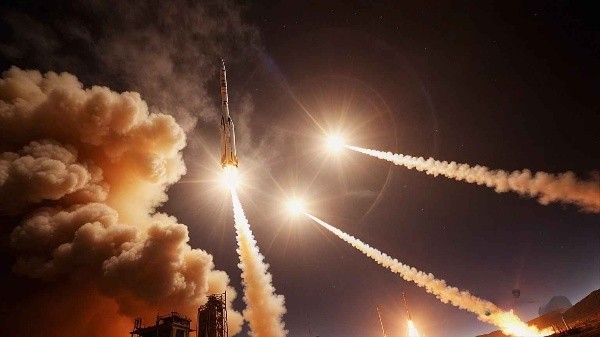Iran’s Plan to Strike Back Against the U.S.
Iran’s Military Preparations Following U.S. Attacks
Loading...

The Islamic Republic’s plan for a response to the Israeli regime’s potential strikes on the country is “fully ready,” and will be “decisively” implemented in case of aggression, according to an informed source in Iran’s Armed Forces.
Iran's Military Readiness
In a recent statement, an informed source from Iran's Armed Forces revealed that the Islamic Republic has a comprehensive plan in place to respond decisively to any potential Israeli strikes. This declaration underscores Iran's commitment to safeguarding its sovereignty and responding to perceived threats from Israel. The source, speaking to the Tasnim news agency, emphasized that the plan is "fully ready" and will be executed without hesitation if aggression occurs.
Targeting Strategy
The Iranian military has developed a "bank of various targets" within the Israeli-occupied territories. The nature of Iran's retaliation will depend on the specifics of any Israeli action. The source stated, "The plan for the necessary response to the possible measure of the Zionists is completely ready," indicating that Iran is prepared to act swiftly and effectively in the event of an attack. The military strategy includes multiple types of reciprocal strikes, allowing for flexibility based on the situation at hand.
Operation True Promise II
This readiness was recently demonstrated during Operation True Promise II, where Iran launched 200 missiles targeting Israeli military and intelligence bases across the occupied territories. This operation was a direct response to what Iran described as deadly aggression against its nation and other regional allies. The source highlighted that the operation showcased Iran's capability to "raze to the ground any place we intend to," reinforcing the message that Iran is not only prepared but also willing to take significant military action if provoked.
Context of Recent Aggressions
The backdrop to these military preparations includes a series of aggressive actions by Israel that have resulted in significant casualties among Iranian allies. Notably, the recent aggression led to the deaths of key figures such as Hamas's political leader Ismail Haniyeh, Hezbollah's leader Sayyed Hassan Nasrallah, and Abbas Nilforoushan, a senior commander of Iran's Islamic Revolution Guards Corps (IRGC). These events have heightened tensions in the region and solidified Iran's resolve to respond robustly to any further Israeli actions.
Historical Precedents
Iran's military strategy is not new; it follows a pattern established in previous operations. In April, Iran executed a similar operation, firing over 300 missiles and drones at Israeli targets in response to attacks on its diplomatic facilities in Syria. This historical context illustrates Iran's consistent approach to retaliation and its commitment to defending its interests against perceived threats.
Israeli Response and Regional Implications
In light of these developments, Israeli Prime Minister Benjamin Netanyahu has asserted that Israel has the "duty and the right to defend itself" against such attacks. This statement reflects the ongoing cycle of aggression and retaliation between the two nations, which has significant implications for regional stability. Tehran has warned that any future aggression will be met with a response of "multiple magnitudes," targeting all aspects of Israeli infrastructure.
Conclusion
As tensions continue to escalate between Iran and Israel, the Islamic Republic's military readiness and strategic planning signal a willingness to engage in significant military action if provoked. The situation remains fluid, with both sides preparing for potential confrontations that could have far-reaching consequences for the region. Iran's commitment to its response plan underscores the seriousness with which it views Israeli actions and the lengths it is prepared to go to defend its sovereignty and interests.
Editor
Iran’s Military Preparations Following U.S. Attacks
Troops remain in five strategic locations, raising fears of renewed tensions and long-term occupation.
Opposition forces have taken control of the capital after a significant offensive. Here is how it unravelled.
